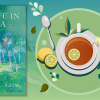Does drinking tea cause kidney stones? An informative analysis

Tea is cherished globally for its comforting qualities and potential health benefits. However, questions about its connection to kidney stone formation persist. Is tea a risk factor for kidney stones, or is this a misunderstanding? Let us explore the facts.
Understanding kidney stones
Kidney stones are solid deposits of minerals and salts that form when urine becomes overly concentrated. These stones can vary in composition:
1. Calcium oxalate stones: The most common type, formed when calcium binds with oxalate.
2. Uric acid stones: Often linked to high-protein diets.
3. Struvite stones: Associated with urinary tract infections.
4. Cystine stones: A rare type resulting from genetic conditions.
Symptoms often include severe pain in the back or sides, blood in the urine, and frequent urination.
Tea and oxalates: a connection?
Tea, particularly black tea, contains oxalates—compounds naturally present in many plants. When consumed excessively, these oxalates can bind with calcium in the urine, potentially forming calcium oxalate stones.
Oxalate levels in different teas
Black tea: High in oxalates; excessive consumption poses a greater risk.
Green tea: Contains significantly lower oxalate levels, making it a safer option.
Herbal teas: Often oxalate-free, but individual ingredients should be verified.
What does the research say?
Scientific studies reveal mixed findings about tea and kidney stones:
Risk with black tea: Research in the Clinical Journal of the American Society of Nephrology suggests that excessive black tea intake could increase oxalate levels, raising the risk of stones.
Green tea benefits: Its lower oxalate content and antioxidant properties may reduce stone risk.
Iced tea caution: Iced tea, due to its concentrated nature, contains higher oxalate levels, potentially heightening the risk for stone formation.
Practical tips for tea lovers
Tea enthusiasts can enjoy their favourite beverage while minimising risks by adopting these practices:
1. Moderate consumption: Limit black tea intake to 1-2 cups daily.
2. Hydration: Drink ample water to dilute oxalates and reduce the likelihood of stone formation.
3. Choose green or herbal teas: These alternatives are generally safer and still provide health benefits.
4. Pair tea with calcium-rich foods: Calcium in foods like milk or yoghurt binds with oxalates in the gut, reducing absorption.
5. Skip the sugar: Over-sweetened teas may increase the risk of uric acid stones.
For most people, moderate tea consumption is unlikely to cause kidney stones. However, those prone to stone formation or with certain health conditions should exercise caution. Opting for green tea or herbal blends offers a flavourful way to enjoy tea without the associated risks. Tea is a delightful and largely safe beverage—just enjoy it wisely!
The writer is a student in the Department of Food and Nutrition at the Government College of Applied Human Science. Email: [email protected]

 For all latest news, follow The Daily Star's Google News channel.
For all latest news, follow The Daily Star's Google News channel. 








Comments